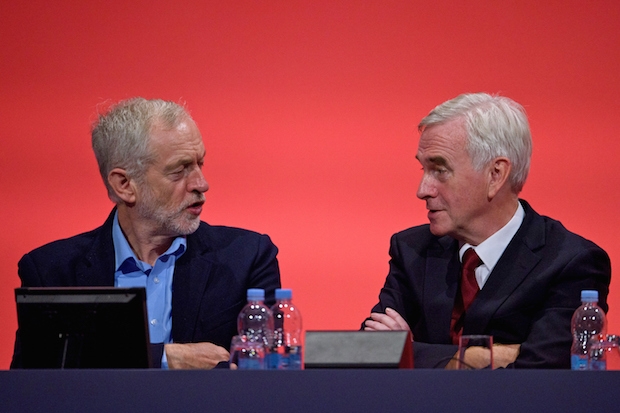It’s quite clear what the Tory approach to a vote on British involvement in action against Islamic State in Syria will be: the Prime Minister will set out his strategy for this later this week, warning MPs that they need to choose to be ‘Churchill not Chamberlain’. George Osborne warned this morning on Marr that a second defeat in the Commons on Syria ‘would be a publicity coup for Isil, that would send a terrible message about Britain’s role in the world’.
But Labour’s position is, of course, not clear at all at present. Jeremy Corbyn’s slogan of ‘straight talking, honest politics’ sounds like an aspiration at present. Caroline Flint has just complained on the Daily Politics that frontbenchers are unable to speak with one voice on policies, which is a statement of fact, not opinion. It is not even clear whether Corbyn will give his party a free vote on Syria, or whether he will set a position that is then whipped, and if so, whether that position will be his own position, or the position that his own Shadow Foreign Secretary Hilary Benn would prefer.
On Marr, John McDonnell said the party hadn’t decided its position yet:
‘What will happen is we will consider this in Shadow Cabinet and then we’ll go to the Parliamentary Labour Party. Most of those MPs, as well, will be consulting their local constituency parties, as they did, and then we’ll come to a considered view. My view has always been that I think Parliament should act as Parliament, not on a party-political basis and we should arrive at a view which is in the best interests of the country.’
This all sounds rather reasonable, but many MPs and frontbenchers will find the line ‘consulting their constituency parties’ rather more worrying than they used to. Some of them are rather wary of the membership of those parties, particularly that the membership may try to deselect them if they make a wrong move, even though Corbynite campaigning group Momentum has insisted it will do no such thing.
McDonnell said he hoped the debate could move beyond the Churchill-or-Chamberlain rhetoric, but what Labour proposes to say in its stead isn’t at all clear. The party doesn’t have long before its confusion is highlighted once again: if there is a statement in the Commons tomorrow on Friday night’s UN vote, then Labour will need to respond to that. Whose stance will it adopt tomorrow?







Comments